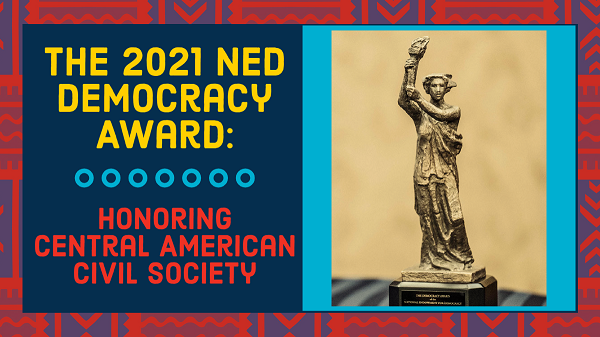Latin America’s democracies look almost uniformly less healthy than they did a decade ago, the Economist reports.
Secretary of State Antony J. Blinken recently announced sanctions against seven public officials in El Salvador and Guatemala, putting them on the State Department’s official list of “Undemocratic and Corrupt Actors,” notes Christopher Sabatini, senior research fellow at the Chatham House in London and the founder of Global Americans and Americas Quarterly.
This round added to the more than 300 individuals the United States had already placed sanctions on in Cuba, Nicaragua, Venezuela, Honduras, El Salvador and Guatemala, and to U.S. diplomatic and financial sanctions on the governments of Cuba, Nicaragua and Venezuela, he writes for the New York Times.
In this respect at least, the U.S. is doing what’s required to counter authoritarianism in Central America. Follow the money, according to California State University’s Ricardo J. Valencia and Michael Paarlberg, an assistant professor of political science at Virginia Commonwealth University.
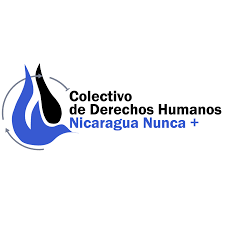 Reviewing the terms of trade agreements in light of corruption and democratic backsliding could have major political impacts in the region, they write for Foreign Policy. There is precedent for this: In Nicaragua, the United States has already responded to the Ortega government’s persecution of political opponents and election rigging by threatening to review the country’s participation in CAFTA-DR. Trade agreements include provisions for labor rights and support for civil society organizations, some of which are under threat by those governments.
Reviewing the terms of trade agreements in light of corruption and democratic backsliding could have major political impacts in the region, they write for Foreign Policy. There is precedent for this: In Nicaragua, the United States has already responded to the Ortega government’s persecution of political opponents and election rigging by threatening to review the country’s participation in CAFTA-DR. Trade agreements include provisions for labor rights and support for civil society organizations, some of which are under threat by those governments.
The U.S. Congress has also passed legislation championed by Representative Eliot Engel (D-NY) that requires the United States to name and sanction corrupt or undemocratic officials in the region, the Council on Foreign Relations adds.
The Biden administration should support the Northern Triangle countries in ensuring that corrupt and undemocratic actors in the region face consequences, and the Engel list could be an important tool to use in that process, said a recent CSIS analysis. The administration should also ensure that there are clear criteria for adding undemocratic and corrupt individuals to the Engel list.
The Northern Triangle countries of El Salvador, Guatemala and Honduras in particular have seen a surge in corruption allegations emerging from government pandemic spending, according to Deborah Ullmer, the National Democratic Institute’s Regional Director for Latin America and the Caribbean. And they are combating chronic problems of widespread violence and crime, corrupt elites linked to criminal networks and impunity from the law by public officials, she told a Senate Foreign Relations Committee hearing earlier this year.
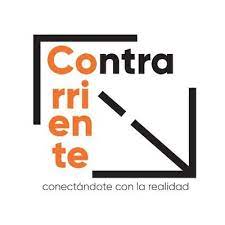 Together with the lack of economic opportunity, deep social inequality and the corrosive impact of unresponsive political institutions, these challenges help fuel migration and undermine democracy, Ullmer added. The COVID-19 pandemic has further increased pressure on already fragile democratic institutions and underscored the need for transparency, oversight and safeguarding fundamental democratic rights.
Together with the lack of economic opportunity, deep social inequality and the corrosive impact of unresponsive political institutions, these challenges help fuel migration and undermine democracy, Ullmer added. The COVID-19 pandemic has further increased pressure on already fragile democratic institutions and underscored the need for transparency, oversight and safeguarding fundamental democratic rights.
The region is beset by severe political polarization and democratic backsliding, according to a recent Carnegie report on Reimagining Regional Governance:
- In Mexico, President Andrés Manuel López Obrador is undermining democracy by seeking to concentrate power in an already strong executive;
- In Nicaragua, the increasingly authoritarian administration of President Daniel Ortega has pushed through new laws to name “traitors” and to pressure media and human rights groups opposing his grip on power.
- In El Salvador, Bukele has enacted a series of controversial policies that many observers believe represent a serious threat to democracy.
- Neighboring Honduras is not faring much better, as an inflammable mix of corruption, violence, and authoritarianism under President Orlando Hernández is generating massive outmigration.
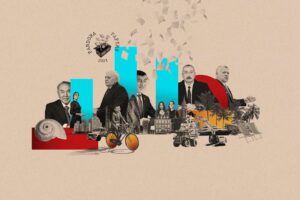
Credit: OCCRP
The recent release of the Pandora Papers (right) has shed further light on the regional elites’ corruption.
Civil society is also under acute pressure, especially independent media.
In El Salvador, President Nayib Bukele has fostered hostilities toward the free press, with much of his ire trained on El Faro (“The Lighthouse”), a digital investigative powerhouse that has exposed countless wrongdoings in his administration, Savannah Jacobson writes for the Columbia Journalism Review. A report from earlier this month by the Association of Journalists of El Salvador documented 177 attacks against journalists this year, thirty-four of which were carried out by the National Civil Police.
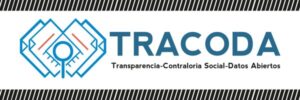 El Salvador’s populist president is also following the playbook of corrupt elites in Guatemala, Nicaragua, and Honduras when it comes to top courts, say Princeton University’s Will Freeman and Adriana Beltrán, director of the Citizen Security Program at the Washington Office on Latin America. His party’s supermajority in the legislative assembly purged his critics from the country’s top courts and attorney general’s office, replacing them with the president’s allies, write for Foreign Policy.
El Salvador’s populist president is also following the playbook of corrupt elites in Guatemala, Nicaragua, and Honduras when it comes to top courts, say Princeton University’s Will Freeman and Adriana Beltrán, director of the Citizen Security Program at the Washington Office on Latin America. His party’s supermajority in the legislative assembly purged his critics from the country’s top courts and attorney general’s office, replacing them with the president’s allies, write for Foreign Policy.
Each Central American country differs from the others and has its own unique problems. Yet all have certain things in common, the Economist suggests:
They have long been dominated by small yet powerful political and economic elites that do not necessarily favour democracy. Institutions are young, weak or politically charged. ‘’’Poor governance has led to insecurity, economic stagnation and shoddy public services. Institutions that ought to uphold the rule of law, such as the courts and un-backed bodies, have been co-opted or dismantled, allowing corruption to increase. … The pandemic provided a pretext to curtail civil liberties in the name of public health.
The region “fell off a cliff” last year, says Dan Restrepo of the Centre for American Progress, a think-tank in Washington, DC.
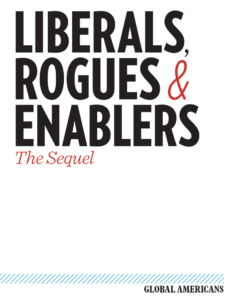 Over the past several years, the quality of democracy has eroded in numerous countries, along with public satisfaction with how democracy is working, notes a recent Congressional Research Service analysis:
Over the past several years, the quality of democracy has eroded in numerous countries, along with public satisfaction with how democracy is working, notes a recent Congressional Research Service analysis:
Venezuela Cuba, and Nicaragua are ruled by authoritarian governments repressing the political opposition. In 2019, many countries in the region experienced social unrest fueled by political factors such as fraudulent elections, weak democratic institutions, politicized judicial systems, public corruption scandals, and high levels of crime and violence. Economic factors, such as declining or stagnant growth rates and high levels of income inequality and poverty, also increased social pressure.
Entrenched elites in Guatemala and Honduras have succeeded in dismantling independent commissions that had proven effective at uprooting corruption, while elsewhere, leaders promising reform have failed to deliver, World Politics Review observes. Meanwhile, Bukele’s authoritarian slide has raised alarm over the health of El Salvador’s democracy, while Nicaraguan President Daniel Ortega seems intent on stifling whatever space for political opposition and dissent remained following his violent crackdown of popular protests three years ago.
According to a Wilson Center report on U.S. foreign aid in Central America from 2014 to 2019, “the most important contributing factor to limited growth and social progress in the Northern Triangle is resistance to anti-corruption and good governance reforms by a small but powerful set of political and economic actors with a deep stake in maintaining the status quo,” said NDI’s Ullmer. In all three countries, NDI’s reform-minded partners inside and outside of government have advocated for political and electoral reforms and, in some cases like in Guatemala, secured political backing for government and legislative action.
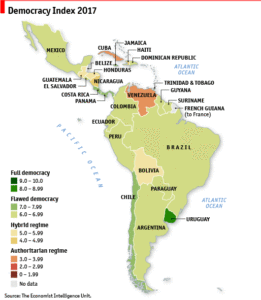
Credit: EIU
On the other hand, while Latin America continues to experience democratic backsliding, “the region remains the most democratic emerging region globally — scoring below only Western Europe and the United States,” according to the Economist’s most recent survey of the state of democracy, she adds.
The Biden administration has an opportunity to strengthen democratic governance, say Patricio Navia, a professor of liberal studies at NYU, and Lucas Perelló, a researcher at The New School. The $4 billion Biden promised to invest in Central America should be used to combat authoritarianism and promote sustainable democratization, they write for Americas Quarterly:
Fortunately, the administration is aware of the threat of authoritarianism in the region. Bukele received a cold shoulder from the White House on an unannounced trip to Washington a few days after Biden’s inauguration. That was a welcome sign for the cause of democracy in the region after four years of neglect.
The Biden administration has vowed to rebuild strong hemispheric ties based on a long-standing component of U.S. policy – support for democracy promotion, including strengthening civil society and promoting human rights and the rule of law, the CRS analysis observes.
The US Congress’s FY2021 appropriations measure (P.L. 116-260) included the United States-Northern Triangle Enhanced Engagement Act, requiring the State Department to develop a five-year strategy to advance economic prosperity, combat corruption, strengthen democratic governance, and improve civilian security conditions in El Salvador, Guatemala, and Honduras, notes CRS.
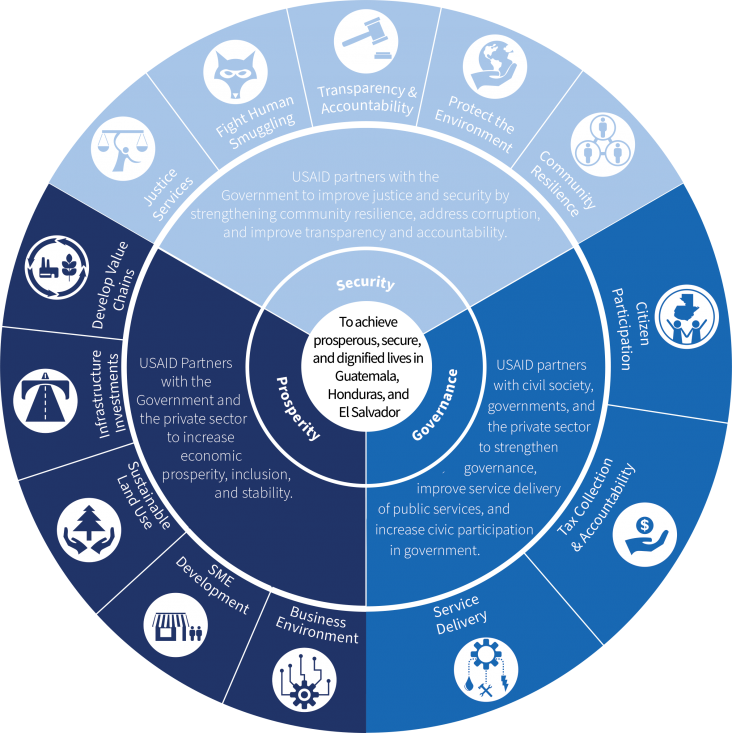
Credit: USAID
In December 2020, Congress passed the U.S. Northern Triangle Enhanced Engagement Act which requests the creation of a five-year strategy from the secretary of state and USAID administrator on efforts to advance prosperity, fight corruption, strengthen democratic institutions, increase citizen security and human rights, and halt irregular migration, CSIS observes.
Earlier this year, USAID Administrator Samantha Power traveled to Honduras, El Salvador, and Guatemala to meet with civil society representatives, governments, and business leaders, and address the governance, economic, and security challenges that are driving Central Americans to migrate north, and to underscore the US commitment to fight corruption and support civil society.
Wednesday, October 20, 2021. The National Endowment for Democracy (NED) recognizes four of its Central America civil society partners with its 2021 Democracy Award:
- Colectivo de Derechos Humanos Nicaragua Nunca Más is dedicated to preserving historical memory in Nicaragua and seeking justice for victims of the state-led violence unleashed by the Ortega regime in 2018.
- Contracorriente provides Honduran citizens with objective and accurate information on critical issues such as human rights and corruption.
- The Myrna Mack Foundation (MMF) fights against impunity and helps build democratic rule of law in Guatemala.
- Asociación Transparencia, Contraloría Social y Datos Abiertos (TRACODA) is committed to strengthening democracy and fighting against corruption in public and private spheres.
Keynote and Panels at 4:00 p.m. EDT. Award Presentation at 6:00 p.m. EDT RSVP
Keynote remarks by Ricardo Zúñiga, Principal Deputy Assistant Secretary for Western Hemisphere Affairs and Special Envoy for the Northern Triangle, U.S. Department of State.
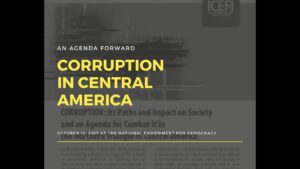 Panel I: Democracy and Governance in Central America: Defending Civic Space and Independent Media for Democratic Accountability
Panel I: Democracy and Governance in Central America: Defending Civic Space and Independent Media for Democratic Accountability
Moisés Naím, Carnegie Endowment for International Peace (moderator);
Antonia Urrejola Noguera, Inter-American Commission on Human Rights;
Santiago Cantón, Inter-American Dialogue;
Luis Botello, International Center for Journalists.
Panel II: Discussion with 2021 NED Democracy Awardees
Damon Wilson, National Endowment for Democracy (moderator);
Gonzalo Carrión, Nicaragua Nunca Más;
Helen Mack, Myrna Mack Foundation;
Diego Jacobo, TRACODA;
Jennifer Ávila, Contracorriente.
Presentation of Democracy Awards by Members of Congress
featuring remarks by
Senator Tim Kaine
Representative Norma J. Torres
